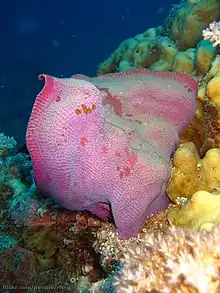Ianthella basta
Ianthella basta is a species of fan-shaped sea sponge in the class Demospongiae.[1] It is also known as the elephant ear sponge,[2] paper sponge, or scroll sponge.[3]
| Ianthella basta | |
|---|---|
 | |
| Elephant ear sponge | |
| Scientific classification | |
| Domain: | Eukaryota |
| Kingdom: | Animalia |
| Phylum: | Porifera |
| Class: | Demospongiae |
| Order: | Verongiida |
| Family: | Ianthellidae |
| Genus: | Ianthella |
| Species: | I. basta |
| Binomial name | |
| Ianthella basta (Pallas, 1766) | |
| Synonyms[1] | |
|
List
| |
A sponge measuring 1.7 m in height and 9.5 m circumference has been estimated to be about 8 years old.[2]
Distribution
The elephant ear sponge is found in the Indo-Pacific region.[4][3] It is found on coral reefs in areas with rapid water flows.[3]
Ianthella basta are introduced species they do not tend to invade other species territories and are noncompetitive. [5]
Ecology
The sea cucumber (Synaptula lamperti) is closely associated with the sponge and makes use of certain nutrients exuded by it.[6]
Research is being undertaken on various metabolites and other biologically active constituents that are synthesized by the sponge.[7][8]
References
- Van Soest RW, Boury-Esnault N, Hooper JN, Rützler K, de Voogd NJ, de Glasby BA, Hajdu E, Pisera AB, Manconi R, Schoenberg C, Janussen D, Tabachnick KR, Klautau M, Picton B, Kelly M, Vacelet J, eds. (2022). "Ianthella basta (Pallas, 1766)". World Porifera database. World Register of Marine Species. Retrieved 21 April 2022.
- Rohde, Sven; Schupp, Peter J. (2011). "Growth and regeneration of the elephant ear sponge Ianthella basta (Porifera)". Ancient Animals, New Challenges. pp. 219–226. doi:10.1007/978-94-007-4688-6_18. ISBN 978-94-007-4687-9.
- Saltcorner
- "Ianthella basta (Pallas, 1766)". Global Biodiversity Information Facility. Retrieved 21 April 2022.
- Rohde, Sven; Schupp, Peter J. (2012-05-01). "Growth and regeneration of the elephant ear sponge Ianthella basta (Porifera)". Hydrobiologia. 687 (1): 219–226. doi:10.1007/s10750-011-0774-5. ISSN 1573-5117. S2CID 254551431.
- Hammond, L.S.; Wilkinson, Clive R. (1985). "Exploitation of sponge exudates by coral reef holothuroids". Journal of Experimental Marine Biology and Ecology. 94 (1–3): 1–9. doi:10.1016/0022-0981(85)90046-2.
- Kazlauskas, R.; Lidgard, R.O.; Murphy, P.T.; Wells, R.J. (1980). "Brominated tyrosine-derived metabolites from the sponge Ianthella basta". Tetrahedron Letters. 21 (23): 2277–2280. doi:10.1016/0040-4039(80)80023-2.
- Pettit, George R.; Butler, Mark S.; Williams, Michael D.; Filiatrault, Melanie J.; Pettit, Robin K. (1996). "Isolation and structure of hemibastadinols 1−3 from the Papua New Guinea marine sponge Ianthella basta". Journal of Natural Products. 59 (10): 927–934. doi:10.1021/np960249n. PMID 8904842.